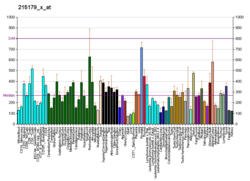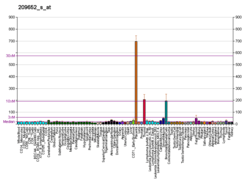Placental growth factor
Placental growth factor is a protein that in humans is encoded by the PGF gene.[5][6]
Placental growth factor (PGF) is a member of the VEGF (vascular endothelial growth factor) sub-family - a key molecule in angiogenesis and vasculogenesis, in particular during embryogenesis. The main source of PGF during pregnancy is the placental trophoblast. PGF is also expressed in many other tissues, including the villous trophoblast.[7]
Placental growth factor (PGF) is a protein-coding gene and a member of the vascular endothelial growth factor (VEGF) family. PGF is ultimately associated with angiogenesis. Specifically, PGF plays a role in trophoblast growth and differentiation. Trophoblast cells, specifically extravillous trophoblast cells, are responsible for invading maternal arteries. Proper development of blood vessels in the placenta is crucial for proper embryonic development. Under normal physiologic conditions, PGF is also expressed at a low level in other organs including the heart, lung, thyroid, and skeletal skeletal muscle.
Clinical significance
Placental growth factor-expression within human atherosclerotic lesions is associated with plaque inflammation and neovascular growth.[8][9]
Serum levels of PGF and sFlt-1 (soluble fms-like tyrosine kinase-1, also known as soluble VEGF receptor-1) are altered in women with preeclampsia. Studies show that in both early and late onset preeclampsia, maternal serum levels of sFlt-1 are higher and PGF lower in women presenting with preeclampsia. In addition, placental sFlt-1 levels were significantly increased and PGF decreased in women with preeclampsia as compared to those with uncomplicated pregnancies. This suggests that placental concentrations of sFlt-1 and PGF mirror the maternal serum changes. This is consistent with the view that the placenta is the main source of sFlt-1 and PGF during pregnancy.1
PGF is a potential biomarker for preeclampsia, a condition in which blood vessels in the placenta are too narrow, resulting in high blood pressure. As mentioned before, extravillous trophoblast cells invade maternal arteries. Improper differentiation may result in hypo-invasion of these arteries and thus failure to widen enough. Studies have found low levels of PGF in women who were diagnosed with preeclampsia later in their pregnancy.
References
- 1 2 3 GRCh38: Ensembl release 89: ENSG00000119630 - Ensembl, May 2017
- 1 2 3 GRCm38: Ensembl release 89: ENSMUSG00000004791 - Ensembl, May 2017
- ↑ "Human PubMed Reference:".
- ↑ "Mouse PubMed Reference:".
- ↑ "Entrez Gene: PGF placental growth factor, vascular endothelial growth factor-related protein".
- ↑ Maglione D, Guerriero V, Viglietto G, Ferraro MG, Aprelikova O, Alitalo K, Del Vecchio S, Lei KJ, Chou JY, Persico MG (April 1993). "Two alternative mRNAs coding for the angiogenic factor, placenta growth factor (PlGF), are transcribed from a single gene of chromosome 14". Oncogene. 8 (4): 925–31. PMID 7681160.
- ↑ Khalil A, Muttukrishna S, Harrington K, Jauniaux E (July 2008). Lumbiganon P, ed. "Effect of antihypertensive therapy with alpha methyldopa on levels of angiogenic factors in pregnancies with hypertensive disorders". PloS One. 3 (7): e2766. PMC 2447877
 . PMID 18648513. doi:10.1371/journal.pone.0002766.
. PMID 18648513. doi:10.1371/journal.pone.0002766. - ↑ Khurana R, Moons L, Shafi S, Luttun A, Collen D, Martin JF, Carmeliet P, Zachary IC (May 2005). "Placental growth factor promotes atherosclerotic intimal thickening and macrophage accumulation". Circulation. 111 (21): 2828–36. PMID 15911697. doi:10.1161/CIRCULATIONAHA.104.495887.
- ↑ Shibuya M (April 2008). "Vascular endothelial growth factor-dependent and -independent regulation of angiogenesis". BMB Reports. 41 (4): 278–86. PMID 18452647. doi:10.5483/BMBRep.2008.41.4.278.
Further reading
- De Falco S (January 2012). "The discovery of placenta growth factor and its biological activity". Experimental & Molecular Medicine. 44 (1): 1–9. PMC 3277892
 . PMID 22228176. doi:10.3858/emm.2012.44.1.025.
. PMID 22228176. doi:10.3858/emm.2012.44.1.025. - Luttun A, Tjwa M, Carmeliet P (December 2002). "Placental growth factor (PlGF) and its receptor Flt-1 (VEGFR-1): novel therapeutic targets for angiogenic disorders". Annals of the New York Academy of Sciences. 979: 80–93. PMID 12543719. doi:10.1111/j.1749-6632.2002.tb04870.x.
- Maglione D, Guerriero V, Viglietto G, Delli-Bovi P, Persico MG (October 1991). "Isolation of a human placenta cDNA coding for a protein related to the vascular permeability factor". Proceedings of the National Academy of Sciences of the United States of America. 88 (20): 9267–71. PMC 52695
 . PMID 1924389. doi:10.1073/pnas.88.20.9267.
. PMID 1924389. doi:10.1073/pnas.88.20.9267. - Maglione D, Guerriero V, Viglietto G, Ferraro MG, Aprelikova O, Alitalo K, Del Vecchio S, Lei KJ, Chou JY, Persico MG (April 1993). "Two alternative mRNAs coding for the angiogenic factor, placenta growth factor (PlGF), are transcribed from a single gene of chromosome 14". Oncogene. 8 (4): 925–31. PMID 7681160.
- Park JE, Chen HH, Winer J, Houck KA, Ferrara N (October 1994). "Placenta growth factor. Potentiation of vascular endothelial growth factor bioactivity, in vitro and in vivo, and high affinity binding to Flt-1 but not to Flk-1/KDR". The Journal of Biological Chemistry. 269 (41): 25646–54. PMID 7929268.
- Hauser S, Weich HA (1994). "A heparin-binding form of placenta growth factor (PlGF-2) is expressed in human umbilical vein endothelial cells and in placenta". Growth Factors. 9 (4): 259–68. PMID 8148155. doi:10.3109/08977199308991586.
- Mattei MG, Borg JP, Rosnet O, Marmé D, Birnbaum D (February 1996). "Assignment of vascular endothelial growth factor (VEGF) and placenta growth factor (PLGF) genes to human chromosome 6p12-p21 and 14q24-q31 regions, respectively". Genomics. 32 (1): 168–9. PMID 8786112. doi:10.1006/geno.1996.0098.
- Ziche M, Maglione D, Ribatti D, Morbidelli L, Lago CT, Battisti M, Paoletti I, Barra A, Tucci M, Parise G, Vincenti V, Granger HJ, Viglietto G, Persico MG (April 1997). "Placenta growth factor-1 is chemotactic, mitogenic, and angiogenic". Laboratory Investigation; A Journal of Technical Methods and Pathology. 76 (4): 517–31. PMID 9111514.
- Vuorela P, Hatva E, Lymboussaki A, Kaipainen A, Joukov V, Persico MG, Alitalo K, Halmesmäki E (February 1997). "Expression of vascular endothelial growth factor and placenta growth factor in human placenta". Biology of Reproduction. 56 (2): 489–94. PMID 9116151. doi:10.1095/biolreprod56.2.489.
- Cao Y, Ji WR, Qi P, Rosin A, Cao Y (June 1997). "Placenta growth factor: identification and characterization of a novel isoform generated by RNA alternative splicing". Biochemical and Biophysical Research Communications. 235 (3): 493–8. PMID 9207183. doi:10.1006/bbrc.1997.6813.
- Davis-Smyth T, Presta LG, Ferrara N (February 1998). "Mapping the charged residues in the second immunoglobulin-like domain of the vascular endothelial growth factor/placenta growth factor receptor Flt-1 required for binding and structural stability". The Journal of Biological Chemistry. 273 (6): 3216–22. PMID 9452434. doi:10.1074/jbc.273.6.3216.
- Landgren E, Schiller P, Cao Y, Claesson-Welsh L (January 1998). "Placenta growth factor stimulates MAP kinase and mitogenicity but not phospholipase C-gamma and migration of endothelial cells expressing Flt 1". Oncogene. 16 (3): 359–67. PMID 9467961. doi:10.1038/sj.onc.1201545.
- Gluzman-Poltorak Z, Cohen T, Herzog Y, Neufeld G (June 2000). "Neuropilin-2 is a receptor for the vascular endothelial growth factor (VEGF) forms VEGF-145 and VEGF-165 [corrected]". The Journal of Biological Chemistry. 275 (24): 18040–5. PMID 10748121. doi:10.1074/jbc.M909259199.
- Renedo M, Arce I, Montgomery K, Roda-Navarro P, Lee E, Kucherlapati R, Fernández-Ruiz E (April 2000). "A sequence-ready physical map of the region containing the human natural killer gene complex on chromosome 12p12.3-p13.2". Genomics. 65 (2): 129–36. PMID 10783260. doi:10.1006/geno.2000.6163.
- Maglione D, Battisti M, Tucci M (March 2000). "Recombinant production of PIGF-1 and its activity in animal models". Farmaco. 55 (3): 165–7. PMID 10919072. doi:10.1016/S0014-827X(00)00012-4.
- Roberts-Clark DJ, Smith AJ (November 2000). "Angiogenic growth factors in human dentine matrix". Archives of Oral Biology. 45 (11): 1013–6. PMID 11000388. doi:10.1016/S0003-9969(00)00075-3.
- Iyer S, Leonidas DD, Swaminathan GJ, Maglione D, Battisti M, Tucci M, Persico MG, Acharya KR (April 2001). "The crystal structure of human placenta growth factor-1 (PlGF-1), an angiogenic protein, at 2.0 A resolution". The Journal of Biological Chemistry. 276 (15): 12153–61. PMID 11069911. doi:10.1074/jbc.M008055200.
- Li XF, Charnock-Jones DS, Zhang E, Hiby S, Malik S, Day K, Licence D, Bowen JM, Gardner L, King A, Loke YW, Smith SK (April 2001). "Angiogenic growth factor messenger ribonucleic acids in uterine natural killer cells". The Journal of Clinical Endocrinology and Metabolism. 86 (4): 1823–34. PMID 11297624. doi:10.1210/jc.86.4.1823.
- Su YN, Hsu JJ, Lee CN, Cheng WF, Kung CC, Hsieh FJ (January 2002). "Raised maternal serum placenta growth factor concentration during the second trimester is associated with Down syndrome". Prenatal Diagnosis. 22 (1): 8–12. PMID 11810642. doi:10.1002/pd.218.
- Angelucci C, Lama G, Iacopino F, Maglione D, Sica G (2002). "Effect of placenta growth factor-1 on proliferation and release of nitric oxide, cyclic AMP and cyclic GMP in human epithelial cells expressing the FLT-1 receptor". Growth Factors. 19 (3): 193–206. PMID 11811792. doi:10.3109/08977190109001086.
- Mamluk R, Gechtman Z, Kutcher ME, Gasiunas N, Gallagher J, Klagsbrun M (July 2002). "Neuropilin-1 binds vascular endothelial growth factor 165, placenta growth factor-2, and heparin via its b1b2 domain". The Journal of Biological Chemistry. 277 (27): 24818–25. PMID 11986311. doi:10.1074/jbc.M200730200.






